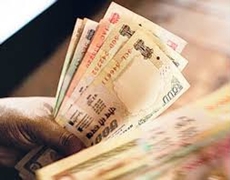Cabinet clears all recommendations of 7th pay panel
29 Jun 2016
The Union cabinet has cleared all recommendations made by the Seventh Pay Commission, which will result in about 23.55 per cent overall increase in salaries, allowances and pensions for more than 1 crore central government staff and pensioners.
 While increasing the government's salary bill, the move is expected to give a big boost to the economy as consumption demand in urban areas is likely rise owing to the higher income levels.
While increasing the government's salary bill, the move is expected to give a big boost to the economy as consumption demand in urban areas is likely rise owing to the higher income levels.
In January, the government had set up a high-powered panel headed by cabinet secretary P K Sinha to process the recommendations of the 7th Pay Commission which will have a bearing on the remuneration of nearly 50 lakh central government employees and 58 lakh pensioners.
The Sinha Committee has submitted its report on the recommendations.
The recommendations
The Pay Commission recommended 23.55 per cent overall increase in salaries, allowances and pensions. This is estimated to put an additional burden of Rs1.02 lakh crore, or nearly 0.7 per cent of the GDP, on the exchequer.
The panel recommended a 14.27 per cent increase in basic pay, the lowest in 70 years. The minimum pay in government is recommended to be Rs18,000 per month. This is more than double the present Rs 7,000.
The maximum pay is set at Rs2,25,000 per month for apex scale and Rs2,50,000 per month for cabinet secretary and others at the same pay level (as against the current Rs90,000 per month).
In order to bring in greater transparency, the report has recommended replacing the present system of pay bands and grade pay with a new pay matrix.
Of the total financial impact of Rs1,02,100 crore, the increase in pay would be Rs39,100 crore, increase in allowances Rs29,300 crore and increase in pension Rs33,700 crore.
Of the outgo, Rs73,650 crore of the outgo will be borne by the general budget and Rs28,450 crore by the Railway Budget.
Implications for economy
The Pay Commission recommendations, once implemented, are expected to boost consumption demand, and in turn growth. According to some economists, the dash of additional expenditure may be just the prod required for restarting the virtuous cycle of consumption, investment, growth, and profits.
However, it is also going to increase the general expenditure of the government. When these recommendations were made, inflation was moderate. But the implementation of these recommendations is coming at a time when inflation is rising again. So there are chances that a spike in demand supported by higher pay to the government staff may push the inflation further up.
It also has to be remembered that crude oil prices that were benign a while back are not so now. The prices for crude are seen around $50 dollar a barrel now and a further increase cannot be ruled out. However, the only thing that may come to the rescue is a Brexit-induced global demand slowdown that will keep commodity prices, including oil, in check.
The Reserve Bank of India, in its last policy statement, had raised these concerns while saying the surprise rise in April inflation has rendered uncertainty its future trajectory.
"...There are upside risks – firming international commodity prices, particularly of crude oil; the implementation of the 7th Central Pay Commission awards which will have to be factored into projections as soon as clarity on implementation emerges; the upturn in inflation expectations of households and of corporates; and the stickiness in inflation excluding food and fuel," it said.
A PTI report said citing sources that the secretaries' panel may have recommended higher pay increase, with minimum entry level pay at Rs23,500 a month and maximum salary of Rs3.25 lakh. If the government approves this, the outgo will increase further and so will the burden on government expenditure. It will also have serious repercussions on fiscal deficit of the government which has been set at 3.5 per cent of GDP.



















